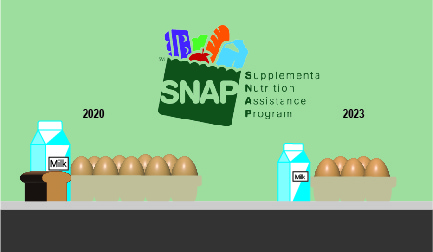
The budget for food safety nets will soon be reduced to pre-COVID-19 levels.
The Supplemental Nutrition Assistance Program (SNAP) is a federal initiative that provides food assistance to low or no-income individuals and families. The Food and Nutrition Service (FNS), according to their website, gave emergency allotments to SNAP users “to help address temporary food needs during the pandemic.” The Consolidated Appropriations Act of 2023 is set to roll back these emergency allotments, affecting 1.6 million households in New York state.
The U.S. Government Accountability Office website issued a post on their WatchBlog about the effect the pandemic had on food insecurity. In it, the office outlined issues caused by COVID-19 as determining factors in the exacerbation of food insecurity in the United States.
“This number may have grown for certain populations during the pandemic as more Americans experienced job loss or reduced incomes as a result of COVID-19’s economic impacts,” they wrote. “COVID-19 disrupted the U.S. food supply chain and contributed to an already existing national hunger crisis.”
Broome County in particular experiences high rates of food insecurity compared to the rest of the New York state, according to Feeding America. On Feeding America’s “Map the Meal Gap,” Broome County was listed as having a food insecurity rate of 13.8 percent, as opposed to the New York state average of 9.6 percent. The data also showed that 76 percent of Broome County residents in 2020 were eligible for SNAP.
The Consolidated Appropriations Act appropriates funds to federal agencies for the 2023 fiscal year. This bill, while providing funding to the defense budget, disaster relief and improving health care, cut the nationwide increase of SNAP benefits established during the pandemic.
According to Forbes, prior to the pandemic in 2020, inflation was at 1.2 percent — and it had climbed to around 8.1 percent in 2022.
Rising inflation and supply chain issues have also had negative impacts on food banks. In an interview with WBNG, Les Aylesworth, director of Community Hunger Outreach Warehouse (CHOW) in Binghamton, explained the difficulties inflation has posed to his food bank.
“Ever since supply chain issues and inflation, it has made getting food that much more difficult for every organization,” Aylesworth said. “We have been traveling farther more often to make sure that the food that gets in the building behind me is stocked and ready for folks.”
In order to mitigate this decrease in SNAP benefits, New York State Governor Kathy Hochul has proposed an emergency assistance supplement for households participating in SNAP, which “will result in New York state’s economy receiving roughly $232 million in federal funding,” as stated on ny.gov. The web page also states that these households should see their SNAP increases posted in late March, when the government allotments will be redirected.
In terms of students facing food insecurity due to the changes in SNAP, The Food Pantry at Binghamton University is an available option for students seeking access to nutritious food. Matthew Pangburn, a Food Pantry supervisor and senior double-majoring in political science and history, described the pantry’s ability to help fill some of these needs.
“While we do not know the SNAP status of the students that utilize the pantry, any effort to decrease the level of support for those who are food insecure will result in increased trouble having access to stable, nutritious and adequate food,” Pangburn wrote in an email. “The Food Pantry is always prepared for any increase in users, and we hope that students who are in need of assistance will use our service.”
Kat Santos, a freshman majoring in integrative neuroscience, noted her observations about the rising inflation rate in Binghamton.
“It’s just very crazy to me to think that when I go to the cheapest grocery store nowadays, just a carton of 18 eggs costs me $7.19,” Santos said. “Even when ordering food, simple meals like mozzarella sticks cost $11.79. Every time I go out I have to cut down on a lot of the things because I simply can’t afford to spend money on things.”


